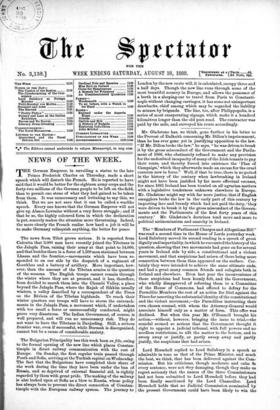The "Members of Parliament Charges and Allegations Bill" was read
a second time in the House of Lords yesterday week. Lord Salisbury moved its second reading in a speech of great dignity and impartiality, in which he recounted the history of the question, showing that two movements had gone on for several years in Ireland side by side, a constitutional and a violent movement, and that suspicions had arisen of there being more connection between them than appeared on the surface. Cer- tainly they were intended to achieve the same ultimate ends, and had a great many common friends and eulogists both in Ireland and elsewhere. Even last year the inconvenience of these suspicions had been keenly felt, and the Government, who wholly disapproved of referring them to a Committee of the House of Commons, had offered to defray for the Parnellite Members the cost of an action for libel against the Times for asserting the substantial identity of the constitutional and the violent movement,—the Parnellites instructing their own chosen counsel, with whom the Attorney-General would associate himself only as a matter of form. This offer was declined. But when this year Mr. O'Donnell brought his action,—without, however, bringing the issue to trial,—the scandal seemed so serious that the Government thought it right to appoint a judicial tribunal, with full powers and no needless restrictions, to sift the matter to the bottom, and to sweep away or justify, or partly sweep away and partly justify, the suspicions that had arisen.


































